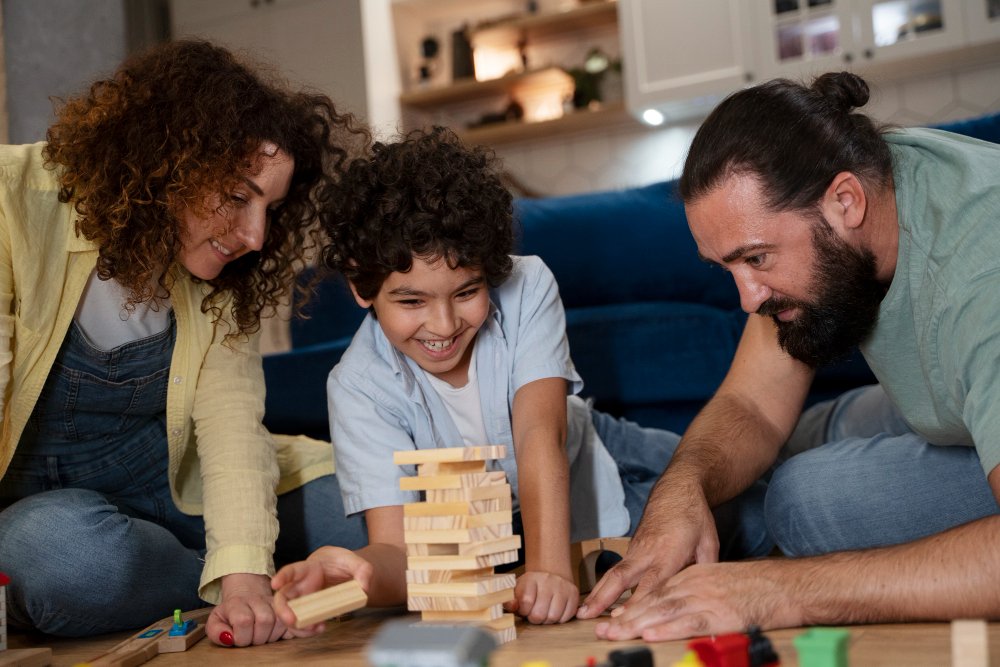10 Importance of Having Good Family Relationship:
Family serves as the foundational structure of our lives, shaping who we are and how we navigate the world. Strong family relationships are vital not only for emotional well-being but also for personal development. In this article, we will discuss the 10 importance of having good family relationship and explore how they contribute to our happiness and fulfillment.
1. Emotional Support
Family members often serve as our primary source of emotional support. They give a listening ear and a shoulder to rest on during troublesome times.
- Coping Mechanism: Having a family to confide in helps us process emotions and cope with stress more effectively. When we share our problems, we often find that our burdens feel lighter.
- Validation of Feelings: Family can help validate our feelings and experiences, making us feel understood and accepted. This is particularly important for children, as they learn to navigate their emotions with the support of their parents and siblings.
- Encouragement: Family members often encourage us to pursue our goals and dreams, boosting our confidence and motivation. Knowing that someone believes in us can make a world of difference, especially when we face self-doubt.
Emotional support from family not only enhances our mental health but also creates an environment where we feel safe to express our vulnerabilities. This open communication can strengthen bonds and cultivate a deeper understanding among family members.

2. Sense of Belonging
A strong family unit fosters a sense of belonging, which is crucial for mental health and well-being.
- Identity Formation: Our families often shape our identities, providing us with a sense of who we are and where we come from. This foundation of identity is vital as we grow and face external challenges in life.
- Safety and Security: Feeling like we belong to a family offers a sense of safety and security, making it easier to navigate life’s challenges. Knowing there’s a group of people who support us creates a sense of stability.
- Support System: In times of crisis, knowing you have a family to turn to creates a strong sense of belonging and community. This support system helps us manage stress, anxiety, and feelings of isolation.
The importance of a sense of belonging cannot be understated; it has a direct impact on our emotional health. When we feel connected to our family, we are more likely to be engaged in social activities and develop healthy relationships outside the family unit.

3. Improved Communication Skills
Good family relationships encourage open communication, which is vital for personal growth.
- Expressing Emotions: Families that prioritize communication help members express their thoughts and emotions more openly. This training supports settling clashes as well as reinforces connections.
- Conflict Resolution: Navigating disagreements within the family teaches important skills for resolving conflicts amicably. Learning how to discuss and manage differences is a life skill that extends beyond family interactions.
- Listening Skills: Engaging in discussions with family members enhances our ability to listen and respond thoughtfully. Good listening skills are essential in any relationship and foster empathy and understanding.
In an environment where communication is prioritized, family members learn the art of effective dialogue. This skill translates into better relationships in professional and social contexts, equipping us with the tools to express ourselves clearly and listen to others.

4. Shared Values and Traditions
Families often instill shared values and traditions that contribute to a sense of continuity.
- Cultural Identity: Family traditions can strengthen cultural identity and instill pride in one’s heritage. Celebrating social practices together encourages solidarity and understanding.
- Moral Framework: Shared values help establish a moral framework, guiding decision-making and behavior. When family members are aligned in their values, it creates a cohesive unit that navigates challenges together.
- Memory Creation: Taking part in family customs makes treasured recollections that endure forever. These shared experiences provide a sense of history and belonging, reinforcing the family bond.
Shared values and traditions also encourage respect and appreciation for one another’s backgrounds and beliefs. This cultural exchange enhances family dynamics and teaches us to embrace diversity within the family unit.

5. Life Skills Development
Strong family relationships provide a platform for developing essential life skills.
- Responsibility: Family duties and responsibilities teach members the importance of accountability. Children learn valuable lessons about reliability, trust, and fulfilling commitments.
- Teamwork: Working together on family projects fosters collaboration and teamwork skills. Whether it’s preparing for a family event or tackling household chores, these shared efforts cultivate a spirit of cooperation.
- Problem-Solving: Facing challenges as a family enhances problem-solving abilities and resourcefulness. Family discussions about challenges encourage critical thinking and collective brainstorming.
By learning these life skills within the family setting, members are better prepared to face external challenges and contribute positively to society.

6. Increased Happiness
Having good family relationships contributes significantly to overall happiness and life satisfaction.
- Quality Time: Investing quality energy with relatives makes delight and reinforces bonds. Whether it’s enjoying meals together, participating in activities, or simply sharing stories, these moments foster happiness.
- Positive Atmosphere: A loving family environment can lead to increased positivity and reduced stress. When family members support and uplift each other, it creates a nurturing atmosphere that enhances overall well-being.
- Supportive Celebrations: Celebrating milestones and achievements together enhances feelings of happiness and fulfillment. Family celebrations, such as birthdays, graduations, or anniversaries, strengthen connections and create lasting memories.
Happiness derived from family relationships often spills over into other areas of life, promoting a positive outlook and improving interactions with friends and colleagues.

7. Health Benefits
Strong family relationships have been linked to numerous health benefits.
- Reduced Stress Levels: A supportive family can help mitigate stress and promote mental well-being. Knowing that we have someone to talk to during tough times reduces anxiety and emotional burdens.
- Healthier Lifestyle Choices: Family can encourage healthy habits, such as exercise and nutritious eating, fostering overall health. Engaging in physical activities together can make healthy living enjoyable and sustainable.
- Emotional Resilience: Emotional support from family contributes to greater resilience, reducing the risk of mental health issues. A strong family network can act as a protective factor against depression and anxiety.
The health benefits of strong family relationships extend beyond mental health; they also contribute to physical well-being. A loving family environment can motivate individuals to adopt healthier lifestyles, leading to improved overall health.

8. Financial Support
Families often provide financial support during difficult times, which can be crucial for stability.
- Shared Resources: Family members may pool resources to help each other through financial challenges. This collaborative approach can alleviate individual burdens and strengthen family ties.
- Advice and Guidance: Experienced family members can offer valuable financial advice, helping younger generations navigate budgeting and investments. This mentorship can be invaluable in fostering financial literacy.
- Safety Net: In emergencies, having a family to turn to for financial assistance can alleviate stress and uncertainty. This safety net ensures that family members are not left to face hardships alone.
Financial support from family reinforces the idea of community and cooperation, helping members thrive collectively while strengthening their bonds.

9. Lifelong Connections
Family relationships are typically long-lasting, providing enduring connections throughout life.
- Shared History: Family members share a unique history that fosters a sense of connection and loyalty. These bonds, built over years of shared experiences, create an unbreakable thread that ties family members together.
- Support Across Lifetimes: As life changes, family members often remain a consistent source of support through various stages. Whether it’s childhood, adolescence, or adulthood, the family unit provides a stable foundation.
- Legacy of Love: Building strong family bonds creates a legacy of love and connection that can be passed down to future generations. This continuity reinforces the importance of family and shapes future family dynamics.
Lifelong connections with family members offer a sense of continuity and support that is invaluable. Knowing we have people who care for us, regardless of life’s circumstances, enhances our sense of security and belonging.

10. Personal Growth and Development
Having good family relationships fosters personal growth and development, contributing to overall well-being.
- Encouragement to Grow: Supportive families encourage members to pursue education and personal interests, fostering growth. This encouragement helps individuals realize their potential and strive for success.
- Feedback and Guidance: Family members provide constructive feedback that can enhance self-awareness and promote self-improvement. This guidance is crucial for developing confidence and making informed decisions.
- Diverse Perspectives: Interacting with family members from different backgrounds and experiences broadens our perspectives and understanding of the world.
By nurturing personal growth within a supportive family environment, individuals are better equipped to face challenges and contribute positively to society.

Conclusion
The 10 importance of having good family relationship cannot be overstated. From providing emotional support to fostering personal growth, strong family connections play a crucial role in our overall happiness and well-being. By investing time and effort into nurturing these relationships, we can cultivate a loving and supportive environment that benefits everyone involved. As we navigate the complexities of life, it is our family that often serves as our anchor, guiding us toward a more fulfilling existence. Prioritizing family relationships is an investment in our emotional health, personal development, and happiness, paving the way for a brighter future.
Here are some short FAQs regarding the importance of having good family relationships:
FAQs
Q1: Why are family relationships important for emotional support?
Family members provide a safe space to share feelings and experiences, helping us cope with stress and emotional challenges. Their understanding and empathy foster resilience and mental well-being.
Q2: How do family relationships impact our sense of belonging?
Strong family bonds create a sense of belonging and security, which enhances self-esteem and helps individuals feel accepted. This sense of community provides comfort and stability during difficult times.
Q3: Can having good family relationships improve communication skills?
Yes, families that prioritize open communication teach members to express their thoughts and emotions effectively. This practice fosters better listening skills and conflict-resolution abilities.
Q4: What role do shared values and traditions play in family relationships?
Shared values and traditions foster a sense of identity and continuity within the family. They create lasting memories and strengthen bonds, helping family members feel connected and supported.
Q5: How do strong family relationships contribute to overall happiness?
Spending quality time with family and celebrating achievements together boosts happiness and life satisfaction. A positive family environment promotes joy and reduces stress.
Discover amazing information and unique finds on FuseBay! Don’t miss out—must visit our website for exclusive articles and top-notch blogs tailored just for you!
Don’t miss out! Watch our video and show some love by hitting the like button—it helps us out! Thank you!







